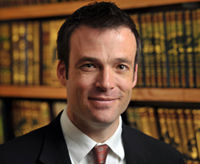
Pope Benedict XVI is in Beirut today (September 14), beginning a three-day visit to Lebanon and a Middle East region convulsed by religious violence ignited by the release of an online movie trailer which mocks the Prophet Mohammed. Gabriel Said Reynolds, Tisch Family Associate Professor of Theology at the University of Notre Dame, believes that the Pope’s visit couldn’t be more timely.
“On the one hand, the Holy Father’s visit to Lebanon is pastoral,” says Reynolds, whose scholarship largely concerns interactions between Christians and Muslims. “Lebanon is a country in the heart of the Arab world with over a million Christians from a rich diversity of traditions and rites, both Catholic and Orthodox, and a country whose saints are venerated throughout the world.
“On the other hand, the visit has a particular symbolic value. Pope John Paul II’s visit to Lebanon in 1997 was a key moment in the reconciliation between Muslims and Christians there, and now Benedict XVI is eager to be a voice advocating peace, forgiveness, and mutual understanding at a time of particular turmoil in the Middle East.”
Reynolds writes and lectures on Christians and Muslims in the middle ages and the historical origins of the Qur’ān (Koran). A leader of an international effort to form an independent association of Qu’ranic scholars, he is at work on a book on How to Read the Qurʾān and the Bible Together.
Learn More >
- Gabriel Said Reynolds faculty page
- Department of Theology
- Related story: Notre Dame Theologian Helping to Build a Society for Qu’ranic Studies
Originally published at newsinfo.nd.edu.


